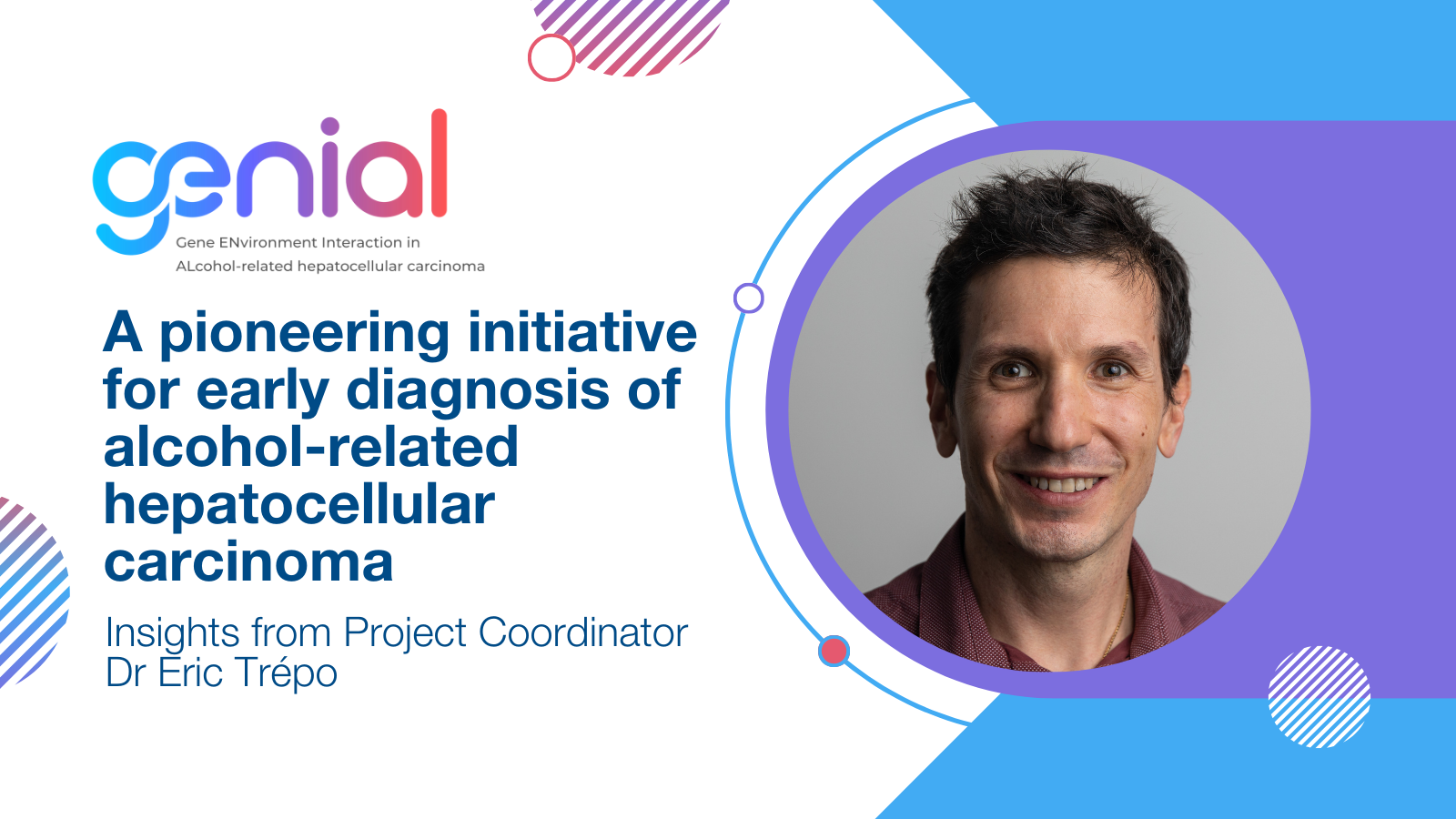GENIAL: A pioneering initiative for early diagnosis of alcohol-related hepatocellular carcinoma

The GENIAL project is dedicated to enhancing our understanding of the early stages of alcohol-related hepatocellular carcinoma (ALD-HCC) by integrating clinical hepatology expertise with artificial intelligence (AI). This innovative initiative, as explained by project coordinator Eric Trépo, aims to significantly improve the diagnosis, prevention, and treatment of ALD-HCC.
“The GENIAL project strives to identify genetic and environmental factors that influence ALD-HCC risk,” says Eric Trépo. “Our primary goals include developing innovative strategies for improved prevention and early detection and identifying potential therapeutic targets at the early stages of ALD-HCC development.” This ambitious project focuses on discovering genetic variants associated with ALD-HCC, assessing environmental influences through detailed questionnaires in an ongoing randomised clinical trial, and analysing cellular interactions and metabolic changes in liver tissue at high resolution.
AI is a pivotal component of GENIAL, synthesising and analysing diverse data to enhance diagnostic tools and predictive models. By collaborating with expert European centers and leveraging large, well-characterised patient cohorts, including several with prospective follow-up, GENIAL aims to refine predictive models at both the cellular and cohort levels.
Addressing challenges in early diagnosis
The early diagnosis of ALD-HCC faces significant challenges due to the disease’s heterogeneous progression, the asymptomatic nature of its early stages, and the limitations of current screening methods. Traditional methods, such as semi-annual ultrasound, often lack sensitivity and specificity, resulting in late detection and poor prognosis.
“GENIAL addresses these challenges by leveraging AI to integrate environmental and genetic data,” Trépo explains. “This enhances risk stratification and early detection, including a randomised control trial assessing the efficacy of combining fast-MRI with ultrasound to improve early detection accuracy.”
Role of Artificial Intelligence
The role of AI in the GENIAL project is crucial for improving the accuracy and efficiency of ALD-HCC diagnosis. “We employ advanced AI techniques, combining self-supervised and supervised learning, to process and integrate various sources of environmental and genetic data,” says Trépo. “Our approach involves convolutional neural networks trained on a large database of public pathology and radiological images. These networks are further refined with GENIAL-specific data, improving their diagnostic accuracy.”
By detecting subtle disease indicators, AI ensures robust performance in diagnostic processes, adhering to ‘Good Machine Learning Practice.’ This integration of AI into the diagnostic workflow significantly enhances the early detection capabilities of ALD-HCC.
Key milestones and achievements
Despite being in its initial stages, the GENIAL project has already achieved several key milestones. “We’ve effectively tackled regulatory hurdles to ensure GDPR compliance, facilitating secure data and sample exchanges across the consortium,” Trépo notes. “Additionally, we have successfully genotyped and sequenced a large number of patient cohorts and are currently analysing our initial datasets.”
A unified protocol for handling and analysing samples, especially for single-cell spatial transcriptomics and metabolomics, has been established to maintain consistency and uphold good practice throughout the project. These milestones align with the overall objectives of improving early diagnosis and prognosis for ALD-HCC patients.
EASL’s involvement
EASL plays a critical role as a dissemination partner in the GENIAL project. “EASL connects the largest network of clinicians, researchers, and healthcare professionals in hepatology,” Trépo highlights. “This partnership ensures the widespread dissemination of GENIAL’s findings, helping our results reach those best positioned to effectively implement them.”
Looking forward, Trépo envisions a significant evolution in ALD-HCC diagnosis and treatment due to advancements made through the GENIAL project. “Our next steps involve rigorous validation of the predictive models we are developing,” he says. “We anticipate that our findings will accelerate prevention, risk stratification, and early diagnosis processes.”
The collaboration with the European Liver Patients Association (ELPA) ensures effective communication of the project’s advancements to patients, ensuring that they directly benefit from the research.
GENIAL Project has received funding from the European Union’s Horizon Europe research and innovation programme under grant agreement No 101096312
EASL serves as a consortium partner in various Horizon-2020 and Horizon-Europe projects by supporting their dissemination and communication activities. For more information about EASL’s current EU-funded projects see https://easl.eu/eu-funded-projects/ and visit the project websites to learn more.

